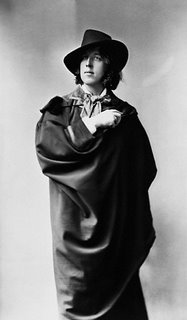Ruminations on Mr. Wilde

I suppose I must begin with the admission that Oscar Wilde is, without a doubt, my favorite dandy, dead or alive (save perhaps M. Erik Satie). He never fails to reassure his readers that behind each of his arguments is a man of infinite wit with a fondness for jest. He's a pleasure to read, to put it simply.
As for his claim that it is life that imitates art, rather than vice versa, I think he is quite on the money. While the point is well made that before there was art there was nature, I think the bulk of his rather weighty argument rests on the statement that "to look at a thing is very different from seeing a thing. One does not see anything until one sees its beauty. Then, and only then, does it come into existence" (41). All our lives we have been trained by works of art and other cultural artifacts to direct our aesthetic attention, our beauty-seeking antane in the direction of a fairly agreed-upon set of objects occurrences. It would be problematic, or at least a bit cocky to assume that we have an innate sense or any a priori knowledge of the beautiful and the aesthetically pleasurable (though, oddly enough, Mr. Wilde would probably credit himself with this preternatural and inextricable good taste). Instead, we have a grand body of recieved information about what constitutes beauty, likes and dislikes that are, more or less common throughout a given social group.
This body of aesthetic information covers enough territory that we rarely find ourselves in a situation that is not represented by some familiar work of art or cultural artifact, whether it be a painting in the Louvre or reality TV. Our own experiences, then, are inseparable from those that we are, willingly or otherwise, exposed to in the business of everyday living. And, like it or not, this is sure to affect our experience of living as well.
Fog, like any easy-on-the-eyes natural phenomenon existed long before it was painted by painters, but only as a physical, passive entity. Not until it was recreated by the hand of an artist did it become an aesthetic object; even if we were to suppose that pre-historic, pre-artistic man had an affinity for fog, he certainly did not have a concept that fog was a thing of beauty worthy of our affection or know that he was supposed to appreciate it.
Lastly, I second his motion that art never expresses anything but itself. Like a spoiled child or a delicate, opium-ravaged Romantic poet, art will quickly collapse under the weight of the world if it is asked to do anything other than just want it wants to at any given moment.
And Wilde's appeal to Walter Pater's famous claim that all art aspires to the condition of music sits nicely with me as well.

0 Comments:
Post a Comment
<< Home